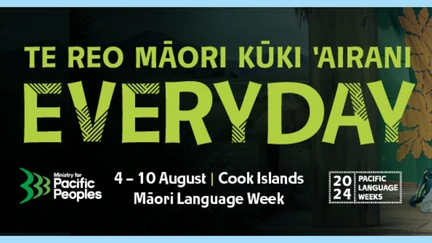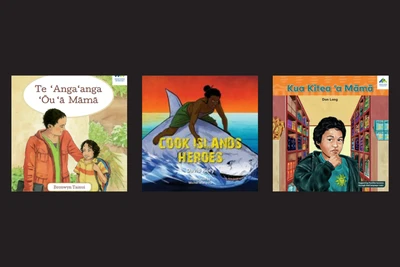Te ʻEpetoma ō Te Reo Māori Kūki ʻĀirani - Cook Islands Language Week 2024
Kia orāna! Welcome to Te ʻEpetoma ō Te Reo Māori Kūki ʻĀirani | Cook Islands Māori Language Week 2024!

Kia orāna kōtou kātoatoa!
Pacific Language Weeks are all about learning more about the different Pacific people that make up a big part of our population in Aotearoa!
This year we celebrate Te ‘Epetoma ō Te Reo Māori Kūki ʻĀirani | Cook Islands Language Week from Sunday 4th July to Saturday 10th July.
‘Epetoma ō Te Reo Māori Kūki ʻĀirani celebrates the indigenous languages spoken by the people of the Cook Islands. These are Cook Islands Māori, the Western Polynesian language Pukapuka, and the distinctive mixture of Cook Islands Māori and English spoken by the people of Palmerston Island. There are a few different dialects of Cook Islands Māori, the most common being Rarotongan.
Cook Islanders in Aotearoa
People of the Cook Islands make up a big part of Aotearoa's Pasifika population. We know that in 2018 there were over 80,000 people of Cook Islands heritage living in Aotearoa, with over 10 percent living Te Whanganui-a-Tara (Wellington). These numbers have potentially grown a lot since then. (Source: 2018 Census)
You or your family might be from the Cook Islands, or you may even have friends or teachers from there!
Every year there is a new theme to reflect on. In 2024 the theme is:
‘Ātui’ia au ki te vaka o tōku matakeinanga | Connect me to the canoe of my tribe.
This is connected to the wider Language Week Series theme for 2024, ‘Sustainability’.
Help us celebrate this special time for the community by learning more about the unique culture, language and history of the Cook Islands through the information, books, and other resources below!

Where are the Cook Islands?
They are located in the South Pacific neighbouring Sāmoa, Niuē and French Polynesia. There are 15 islands altogether with a total land area of 240 square kilometres.
How many people speak Cook Islands Māori?
Te Reo Māori Kūki ʻĀirani (Cook Islands Māori) refers to the many Indigenous languages and dialects (slightly different versions of the same language) spoken in the Cook Islands. This includes:
- Rakahanga and Manihiki
- Tongareva (Penrhyn)
- Ātiu, Miti’āro and Ma‘uke (Ngāpūtoru languages)
- Aitutaki
- Rarotonga
- Mangaia
- Pukapuka
- Palmerston
(Source: Cook Islands Dictionary)
Why are they called the Cook Islands?
The area was first settled around 1000CE by Polynesian people who probably came from Tahiti, which is where the famous navigator Tupaia would come from over 700 years later. You can learn more about Tupaia here: Tupaia | Te Ara Encyclopaedia of New Zealand. They gave the islands names like Rarotonga, Aitutaki, and Rakahanga.
The first European contact with the islands took place in 1595. However, the Cook Islands name comes from the British navigator Captain James Cook, who first arrived on the islands in 1773.
There is still a lot of debate today about whether the Cook Islands should take a new name that reflects the Polynesian history and heritage of the area. Visit Britannica Online to learn more about the history and people of the Cook Islands: Cook Islands | Encyclopaedia Britannica
Learn some Te Reo Māori Kūki ʻĀirani!
Here are some useful phrases to help get started. Pronunciation is mostly similar to Te Reo Māori - so don’t be shy, give it a go!
Kia orāna - Greetings/Hello
ʻAere rā / ʻĒ noʻo rā - Goodbye (to those going/to those staying)
ʻInē? - Please
Meitaki maʻata - Thank you very much
Tatarāʻara - Sorry
Inā ake ana - Excuse me
Pēʻea koe/kōrua/kōtou? - How are you?
Meitaki maʻata au/māua/mātou - I am/We are well
Books
Visit your local library and have a look at our amazing books to learn more about Cook Islands cultures and practice the language. At Newtown Library we also stock the Cook Islands News.
If you don’t have a library card, you can sign up for free!

- Te 'anga'anga 'ōu 'ā māmā = Mum's new job / Tainui, Bronwyn
- Kua kitea 'a māmā = Finding mum / Long, Don
- Cook Islands heroes / Riley, David
- 'Ei for the day / MacGregor, Jill
- Cook Islands : Kūki 'Āirana / Mason, Jean Tekura
- Meitaki taau 'anga'anga, Nana / Ioane, Kairangi